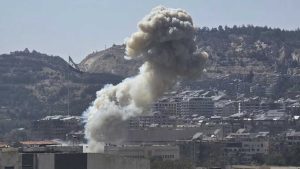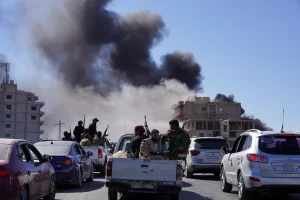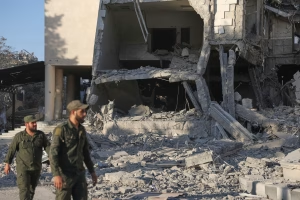New Delhi – Syria announced the beginning of its military withdrawal from Sweida province on Wednesday, marking a significant development in the escalating regional crisis. This decision comes as Israel Strikes Syria intensify, with Damascus facing unprecedented bombardment targeting key government infrastructure. The withdrawal represents a major shift in Syrian government strategy following sustained international pressure and violent sectarian clashes that have claimed over 350 lives.
The announcement coincides with a specific request from the United States for the Syrian government to abandon the majority-Druze southern region. This diplomatic pressure has intensified as Israel Strikes Syria continue to target strategic locations across the country, demonstrating the interconnected nature of regional conflicts and international diplomatic efforts.
Sectarian Violence Triggers Military Deployment

The fresh wave of violence in Sweida province represents the most significant escalation since May, with clashes between Bedouin and Druze communities reaching critical levels. The Syrian Observatory for Human Rights reported that the violence was triggered by the kidnapping of a Druze vegetable merchant, reigniting decades-old tensions between these two communities.
Also Read: Indigo Flight Emergency Landing Mumbai: Engine Malfunction Forces Safe Diversion
The severity of the situation prompted Syrian government deployment to the region, but this intervention has proven controversial and costly. Among the 350 casualties reported, 27 individuals were reportedly killed in summary executions by Syrian forces, prompting President Ahmed Al Sharaa to promise investigations and punishment for all those responsible for these heinous acts.
Ceasefire Attempts and Continued Fighting


Syria’s interior ministry announced a ceasefire in the region on Wednesday, declaring a “total and immediate halt to all military operations” and establishing a committee comprising government representatives and Druze spiritual leaders to supervise implementation. However, the ceasefire proved ineffective as fighting continued, with the situation further complicated when Israel Strikes Syria expanded beyond the immediate conflict zone.
The ineffectiveness of the ceasefire demonstrates the complex nature of the conflict, where local sectarian tensions intersect with broader regional dynamics. The continued violence has created a humanitarian crisis that extends beyond the immediate combatants, affecting civilian populations across the province.
Israeli Military Intervention and Escalation


situation where Israel Strikes Syria, specifically in Sweida province, justifying these actions as protection for the Druze community, significant numbers of whom also reside within Israel. Israeli Prime Minister Benjamin Netanyahu and Defense Minister Israel Katz delivered clear messages to the Syrian government, demanding withdrawal of forces deployed in the region and cessation of actions against Druze populations.
Israel’s Defense Minister, Katz specifically warned that the Israeli Defense Forces would escalate attacks if these messages were not received and acted upon. This threat materialized as Israel Strikes Syria expanded beyond the initial province to target the capital itself, demonstrating Israel’s commitment to its stated protective mission.
Damascus Under Fire: Strategic Targets Hit

Israel Strikes Syria reached a new level of intensity when Israeli forces launched a comprehensive attack on Damascus on Wednesday. The bombardment targeted Syria’s defense ministry building and areas surrounding the Presidential palace, representing a significant escalation in the conflict’s scope and intensity.
Additional strikes were reported near the Mazzeh military airport outside Damascus, indicating a coordinated campaign against Syrian military infrastructure. According to the Syrian health ministry, three people died in these Israeli strikes on the capital, while 34 others sustained injuries, highlighting the human cost of this escalation.
International Reactions and Diplomatic Responses
Syria’s foreign ministry condemned the attacks as a “dangerous escalation,” while Israel’s military chief insisted that Israeli forces were “acting with responsibility, restraint and sound judgment.” This stark contrast in perspectives reflects the broader disagreement about the legitimacy and proportionality of military responses to the crisis.


The United States expressed concern about the situation where Israel Strikes Syria, with Secretary of State Marco Rubio stating, “We want it to stop.” A State Department spokesperson revealed that Washington was requesting Syria to “withdraw their military in order to enable all sides to de-escalate,” demonstrating American diplomatic engagement in resolving the crisis.
Druze Community Leadership and Accord
Sheikh Youssef Jarboua, one of Syria’s main Druze spiritual leaders, read out ten points of an accord in a video broadcast on state television. This agreement includes provisions for “the full integration of the province” of Sweida into the Syrian state, representing a significant change from the current arrangement where Druze areas have been controlled by fighters from the minority community.
The accord represents an attempt to address underlying governance issues that have contributed to the current crisis, potentially offering a framework for sustainable resolution.
Diplomatic Breakthrough and Future Prospects
Secretary of State Marco Rubio later announced on social media that all sides had “agreed on specific steps that will bring this troubling and horrifying situation to an end.” This diplomatic breakthrough suggests that despite the intensity of Israel Strikes Syria and the ongoing violence, there remains potential for negotiated resolution.
The agreement represents hope for de-escalation, though implementation will require sustained commitment from all parties involved. The success of these diplomatic efforts will largely determine whether the current crisis can be resolved without further escalation.
Concluding Statement
The situation where Israel Strikes Syria and the withdrawal from Sweida represents a critical juncture in Middle Eastern regional dynamics. The combination of sectarian violence, international diplomatic pressure, and military escalation has created a complex crisis requiring careful navigation in the situation where Israel Strikes Syria . The announced agreements offer hope for resolution, but sustainable peace will depend on effective implementation and continued international engagement in supporting de-escalation efforts across the region.

